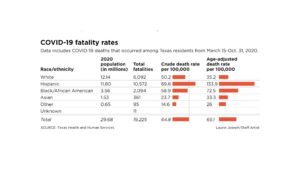The release of a long-awaited report on Texas COVID-19 facilities by race-ethnicity was shocking.[1]Not because our community was unaware of race-ethnic disparities in vaccination rates but rather the large size of these disparities in Texas. As the numbers for age-adjusted death rates per 100,000 revealed, Hispanics were nearly four times more likely to die (133.9) from the coronavirus than whites (35.2), while Blacks (72.5) were twice as likely to die as whites. Asian death rates (33.3) were slightly lower than whites.
Texas State Rep. Shawn Thierry along with other lawmakers have been advocating for the release of this report in order to mobilize statewide efforts to target vulnerable groups like Blacks and Hispanics, although state officials have been reluctant to act more aggressively. In response to the release of this report, Rep. Thierry explained that the findings underscored the need to target resources to communities of color, especially since other data shows that white residents are getting vaccinated at higher rates than Blacks and Latinos. [2]
Given the high death rates for Latinos and Blacks, it is especially surprising that Texas state officials recently threatened to withhold vaccine doses that were allocated to Dallas County if they proceeded with a plan to target vaccinations to zip codes that included higher numbers of vulnerable Black and Latino residents.
Indeed, efforts to block targeted interventions to vulnerable communities contradicted recommendations by the National Academy of Sciences that recommended that “priority be given to ‘people who are considered to be the most disadvantaged or the worst off’ as defined by measures such as the Social Vulnerability Index created by the Centers for Disease Control and Prevention.” [3]
The announcement that the Biden administration will begin shipping vaccines to pharmacies throughout the U.S. was a major sight of relief for two reasons. First, it minimizes the involvement of local politicians in the equitable distribution of the vaccines who have largely bungled the job in its communications, registration and distribution – resulting in higher vaccination rates of higher-income whites than lower-income Blacks and Latinos. Texas politicians will also have less influence in threatening to withhold vaccines to jurisdictions that want to more aggressively vaccinate the more vulnerable communities of color.
Secondly, pharmacies are much easier to access for the elderly, Blacks and Latinos who encounter more barriers in registrations and obtaining vaccinations. The Mega Centers are innovative in terms of providing a centralized location to vaccinate thousands of residents more rapidly; however, not all residents can travel to these Mega Centers or wait in line for hours during cold weather without access to restrooms or food. The distribution of vaccines by pharmacies will not solve all the problems experienced thus far but should lead to significant improvements.
Given the gravity of the higher death rates for Texas Latinos and Blacks, it is disturbing to learn that Texas state officials are delaying any targeted interventions for these groups for several months. Even more disturbing is that state officials threatened to withhold vaccine doses to Dallas County for attempting to follow the science by targeting the more vulnerable groups of Black and Latino zip codes. The State of Texas deserves no praise for their callous response to the lives of its Black and Latino residents.
Reference Notes
[1]Morris, A. (2021, February 2). Report highlights disparities – but proposals targeting effects on minorities months away. The Dallas Morning News, Accessed at:
[2]Ibid.
[3]Cited in Warren, R.C. D.D.Sl, Dr.PH.H., M.Div., Forrow M.D., L., Hodge Sr., D.Min., Ph.D., and Truog, M.D., R.D. (2020, November 26). Trustworthiness before trust – COVID-19 vaccine trials and the Black community. The New England Journal of Medicine. Accessed at: https://www.nejm.org/doi/full/10.1056/NEJMp2030033



